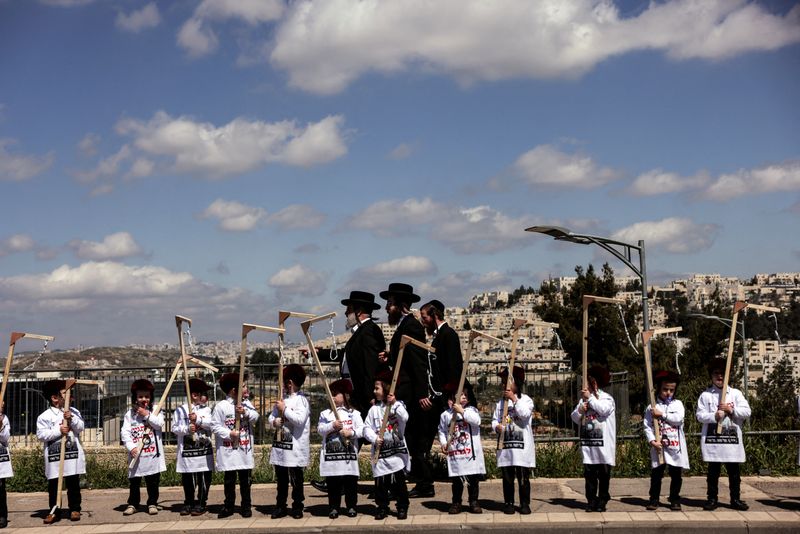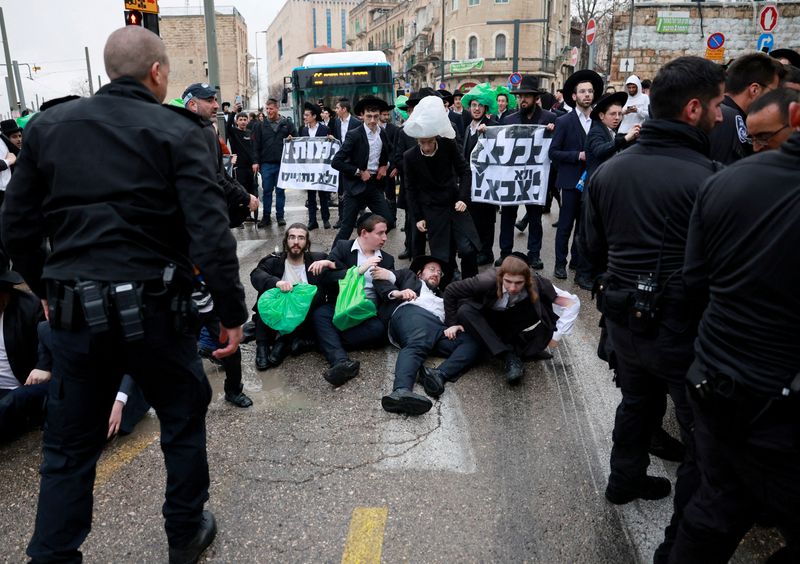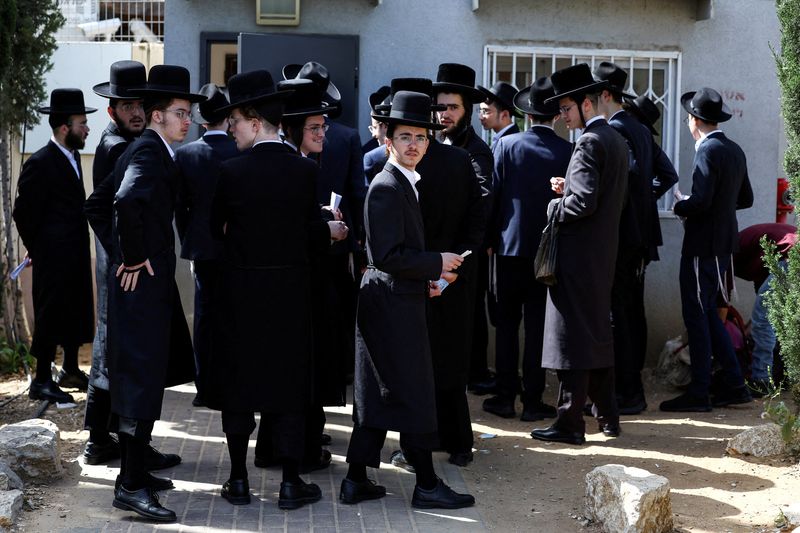
FILE PHOTO: Ultra-Ortodox Jewish men protest against attempts to change government policy that grants ultra-Orthodox Jews exemptions from military conscription in Jerusalem February 26, 2024. REUTERS/Ronen Zvulun/File Photo
By Dan Williams
JERUSALEM (Reuters) – Yossi Levi is a member of the ultra-Orthodox Jewish community, whose exemption from compulsory military service is dividing Israel and threatens to topple its government. He is also a major in the infantry reserves of the Israel Defence Forces (IDF).
The long-standing military waiver for the ultra-Orthodox has sparked waves of protest in recent weeks by more secular Israelis, angry that they are shouldering the risk and drudgery of fighting the war in Gaza, now six months old. In city streets, ultra-Orthodox demonstrators have scuffled with combat veterans who sport khaki shirts and hoist national flags.

FILE PHOTO: Protesters carry a stretcher as they demand equality in Israel’s military service during a demonstration in Jerusalem February 26, 2024. REUTERS/Ronen Zvulun/File Photo
In fact, around 10% of the haredim, as the ultra-Orthodox are known, come forward voluntarily for the standard three years of military service, Levi said. Some go on to be officers, like him.
That amounts to just 1,200 ultra-Orthodox volunteers a year – a tiny number compared to an estimated 170,000 active soldiers and nearly 500,000 reservists in Israel. The IDF does not publish troop numbers.
But Levi, who runs the Netzah Yehuda organisation that encourages ultra-Orthodox enlistment, says attitudes are softening within some parts of the community towards military service amid the war. And that, he hopes, could be enough to ease the current crisis.

FILE PHOTO: Ultra-Orthodox Jewish children hold makeshift gallows as part of a protest against attempts to change government policy that grants ultra-Orthodox Jews exemptions from military conscription, in Jerusalem, March 20, 2024. REUTERS/Ronen Zvulun/File Photo
“We can double it and can triple it in one, two years, and we can see a lot of haredim and it’s going to be enough for the IDF,” said the 33-year-old at his Jerusalem headquarters, where one wall is adorned with pictures of fallen haredi soldiers. “They don’t want all of the haredim.”
Thousands of angry Israelis took to the streets last weekend – many of them military reservists – to call for the removal of Prime Minister Benjamin Netanyahu, whose government relies on ultra-Orthodox support for its survival.
Ultra-Orthodox political parties are deeply invested in keeping their constituents in seminaries and away from the IDF. They see in the military’s brawn a distraction from the Torah and Talmud; in its gender mixing and other progressive facets, affronts to their conservative mores.
The exemption from conscription dates back to the creation of the State of Israel in 1948, designed in part to rebuild rabbinical dynasties destroyed during the Holocaust. But it has attracted criticism as the ultra-Orthodox population has grown rapidly.

FILE PHOTO: Ultra-Orthodox Jewish men protest against attempts to change government policy that grants ultra-Orthodox Jews exemptions from military conscription, in Jerusalem, March 18, 2024. REUTERS/Ammar Awad/File Photo
The issue is coming to a head. As of April 1, state subsidies for draft-age men in seminaries have been suspended on the orders of the Supreme Court. The tribunal, however, granted Netanyahu’s request for an extension until month’s end to keep negotiating over a much-delayed blueprint for a fairer sharing of the burden of military service.

FILE PHOTO: Ultra-Orthodox Jews line up at an Israeli draft office to process their exemptions from mandatory military service at a recruitment base in Kiryat Ono, Israel March 28, 2024. REUTERS/Hannah McKay/File Photo
Two government officials briefed on the talks – who asked not to be identified because of the sensitivity of the information – said that a doubling of the number of haredi voluneers, to 2,500 troops a year, with further increases thereafter, was among the ideas under discussion.
One of the officials said the IDF was considering creating haredi border garrisons that would double as seminaries or assigning haredi soldiers to policing roles enabling regular home leave.
At present, most of the ultra-Orthodox volunteers serve in seven units tailored for their needs. They have all-male training staff, strictly kosher rations and lectures by rabbis.
The IDF declined to comment on the conscription debate, referring policy questions to the government. Netanyahu’s office had no immediate response. The prime minister told reporters on March 29 that the thinking within the ultra-Orthodox community on conscription had come a long way.
“There is real desire here to reach agreement, and not a collision, at the height of a war and with victory just a short distance away,” he said.
Reuters spoke to six serving officials, as well as three figures on opposite sides of the debate, who said the room for compromise is extremely narrow.
Many ultra-Orthodox say they will not accept forced conscription. “Better Dead than Drafted,” read a placard at a recent protest.
“They (secular Israelis) don’t want us to be religious,” said Yisrael Kaya, a haredi attending an anti-conscription protest in Jerusalem grouping a few dozen people. “Therefore, we prefer to die and not to go to the army.”
Rabbi Yitzhak Yosef, Israel’s Sephardi chief chaplain and the spiritual mentor of ultra-Orthodox party Shas, warned the government in a March 9 sermon that haredim would move abroad rather than be forced into the army.
Rabbi Motke Bloy, an educator linked to another ultra-Orthodox party, United Torah Judaism (UTJ), said the vast majority of haredim remained opposed to compulsory IDF service.
“This is persecution for persecution’s sake, with a strong whiff of political antagonism toward Bibi,” he told Reuters, using Netanyahu’s nickname. He said any attempt to impose a compulsory draft would fail: “Tens of thousands of Torah students would rather sit behind bars.”
CABINET DIVIDED
Keeping haredi recruitment voluntary may not satisfy the official tasked with expanding the ranks of an overstretched IDF: Defence Minister Yoav Gallant.
When a compromise bill, setting no quotas for haredi troops in the military nor criminal penalties for such quotas going unmet, leaked to Israeli media last month, Gallant announced that he and the military brass would not back it.
Gallant is being reinforced by two centrist members of Netanyahu’s war cabinet, Benny Gantz and Gadi Eizenkot. Both are former top IDF generals who have also long demanded a comprehensive expansion of conscription and civilian national-service options for Israel’s Arab minority, who, like haredim, are now exempted.
“There is every indication that we’re headed toward a rupture in the government,” said an aide to one of the ministers who, like all six Israeli officials briefed on the closed-door conscription debate, spoke to Reuters on condition of anonymity. All of the officials concurred the discussions were at an impasse, though only one went as far as suggesting that there could be a “rupture”.
Gallant, Gantz and Eizenkot, like the UTJ and Shas, have not formally laid out their red lines. Nor have they indicated where gaps may be bridged in time. The ministers did not respond to a request for comment on the talks.
With the end-month deadline looming, an anti-government protest group drawing on IDF veterans, Brothers in Arms, has staged marches in haredi neighbourhoods, leading to altercations with locals.
Asked about initiatives that might incentivize haredi joining the military, such as the creation of special border garrisons, a Brothers in Arms spokesperson said: “We will be in favour of any solution that entails the full enlistment of haredim society in the military or civilian national service.”
SHORTAGE OF TROOPS
While the IDF does not publish personnel numbers, it has made no secret of needing more troops.
Almost 3,800 have been killed or wounded in the war – a whole brigade’s worth. “And we’re short of several brigades beyond that,” one official said.
With the conflict liable to last months and potentially spread to other fronts, many Israelis say their national cohesion hinges on broader and more equitable conscription.
The ultra-Orthodox are Israel’s fastest-growing minority. The black-coated haredim make up 13% of Israel’s population and are due to reach 19% by 2035 given their high birth rates.
According to the Israel Democracy Institute (IDI), an independent think tank based in Jerusalem, 66,000 ultra-Orthodox men could now be under arms but are not – a dizzying rise from the 400 scholars who were initially exempted at the country’s founding.
The Jerusalem Post reported in late December that, out of a total of 20,000 Haredi reservists, about 7,000 had been operational during the Gaza war. An IDF spokesperson said those were not official figures and declined further comment.
Three of the six Israeli officials interviewed by Reuters said that dragooning haredim would be an untenable threat to delicate ties between synagogue and state. One quailed at the idea of military police chasing draft-dodgers through haredi districts.
Yair Lapid, a liberal ex-prime minister who now leads the parliamentary opposition, has suggested that a haredi draft should be enforced through withholding funds – rather than jail.
“If they don’t get conscripted, they won’t get money,” he said told lawmakers from his secularist party on March 11.
CHANGING HAREDI
Polls show that Israel’s Jewish majority – haredim included – remains strongly supportive of the war, which was triggered by the Oct. 7 cross-border attack by the Hamas militant group that controlled Gaza. Hamas fighters killed some 1,200 people in the lightning strike and seized 253 hostages, of whom 129 remain captive.
Gaza’s health ministry says more than 33,600 Palestinians have been killed since the Israeli offensive in Gaza began.
Levi says haredi soldiers, whose uniforms once stirred hostility in their hometowns, were getting greater respect. “A lot of people there support the IDF much more. They feel that something is different,” he said.
But Bloy, the educator, saw no such change due to the conflict. Those haredim more open to the IDF are motivated mostly by considerations pre-dating the war, such as economic factors, he said.
The IDI has found a 34% poverty rate among haredim, compared to 21% overall in the population. Economists say that has been caused, in part, by many haredi men staying in seminaries – and out of the workforce.
Still, the haredi poverty rate is declining, having been at 44% as recently as 2019, the IDI said – a indicator of a dovetailing with mainstream society, which may be linked to military service.
“There’s a shift taking place in the haredi world today. There is the open haredi, the new haredi,” said Rabbi Karmi Gross, head of the Derech Haim seminary, where some students combine scientific with scriptural studies. Some then go on to serve in IDF technology units that equip them with a future profession.
In combat units, too, haredim were learning leadership skills that help them find civilian careers, Levi said.
Both he and Gross counselled against strong-handed enlistment tactics, saying haredim could be drawn in by incentives.
Levi recommended inducements aimed at haredi men less suited for long hours of scriptural studies: “If we want to be smart, we have to split between the haredim that are learning Torah all day in the yeshivot (seminaries) and the haredim that are not.”
Marking a generational evolution, haredi soldiers who were once considered off-limits for marriage within their disapproving communities can now find like-minded wives through a match-making service offered by Netzah Yehuda.
In its first year of existence, the service has already produced dozens of couples, a spokesman for Netzah Yehuda said.
“After 20 years of work with the haredi society, we can see a lot of girls who want to meet soldiers,” Levi said, referring to haredim who did army service and kept their community values. “They (the women who use the service) want that type of guy.”
Gross said some haredi parents are wary of their daughters ending up the sole bread winner by marrying a seminary student – and that this has helped ease taboos against men’s IDF service.
Yet few haredim inculcate reverence for the military, unlike in mainstream Israeli society, where children are often raised on their parents’ or elder siblings’ war lore.
That alienation from what is a core national institution prompted Bloy to warn against a “culture war” over the issue.
Shimi Schlesinger, a 25-year-old haredi seminary student, told Reuters he understood the anguish of more secular families who had lost their sons and daughters in the war.
“But honestly, we aren’t able to serve in the military. Because, without Torah, a Jewish community would not exist,” he said. “And I believe that Torah protects us even more than the military.”
(Writing by Dan Williams; Editing by Daniel Flynn)
News Related-
Recall Just Announced For Popular Cookies Featured In Holiday Gift Baskets
-
Eagles rally past Bills in overtime as Chiefs win
-
Reality bites the green energy agenda
-
Sandigan orders Marcos Sr. pal to pay workers
-
DSWD: Shear line, LPA affect 1.2 million people; over 18,000 families evacuated
-
The mayor of Paris is making a loud exit from X, calling the platform a 'gigantic global sewer'
-
Rain showers, thunderstorms over Luzon, including Metro Manila — Pagasa
-
'Naruto' live-action film adaptation is in the works
-
NASA Highlights Stingray Nebula
-
Manila's Lagusnilad underpass opens
-
China probes debt-ridden financial giant
-
China's VUCA situation
-
Unraveling the mystery that is diabetes
-
Bangladesh's nuke plant is not going to steal PH investments
